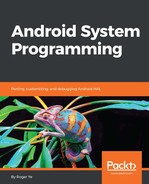Since the libnb.so library is the key starting point for Native Bridge support in Android-x86, we will dive into the details of it now. The Makefile to build libnb.so can be found at device/generic/common/nativebridge/Android.mk. The source code for libnb.so includes only one file, libnb.cpp, as follows:
#define LOG_TAG "libnb"
#include <dlfcn.h>
#include <cutils/log.h>
#include <cutils/properties.h>
#include "nativebridge/native_bridge.h"
namespace android {
static void *native_handle = nullptr;
static NativeBridgeCallbacks *get_callbacks()
{
static NativeBridgeCallbacks *callbacks = nullptr;
if (!callbacks) {
const char *libnb = "/system/"
#ifdef __LP64__
"lib64/arm64/"
#else
"lib/arm/"
#endif
"libhoudini.so";
if (!native_handle) {
native_handle = dlopen(libnb, RTLD_LAZY);
if (!native_handle) {
ALOGE("Unable to open %s", libnb);
return nullptr;
}
}
callbacks = reinterpret_cast<NativeBridgeCallbacks *>
(dlsym(native_handle, "NativeBridgeItf"));
}
return callbacks;
}
// NativeBridgeCallbacks implementations
static bool native_bridge2_initialize(const
NativeBridgeRuntimeCallbacks *art_cbs, const char
*app_code_cache_dir, const char *isa)
{
ALOGV("enter native_bridge2_initialize %s %s",
app_code_cache_dir, isa);
if (property_get_bool("persist.sys.nativebridge", 0)) {
if (NativeBridgeCallbacks *cb = get_callbacks()) {
return cb->initialize(art_cbs, app_code_cache_dir, isa);
}
} else {
ALOGW("Native bridge is disabled");
}
return false;
}
static void *native_bridge2_loadLibrary(const char *libpath, int flag)
{
ALOGV("enter native_bridge2_loadLibrary %s", libpath);
NativeBridgeCallbacks *cb = get_callbacks();
return cb ? cb->loadLibrary(libpath, flag) : nullptr;
}
static void *native_bridge2_getTrampoline(void *handle,
const char *name, const char* shorty, uint32_t len)
{
ALOGV("enter native_bridge2_getTrampoline %s", name);
NativeBridgeCallbacks *cb = get_callbacks();
return cb ? cb->getTrampoline(handle, name, shorty, len)
: nullptr;
}
static bool native_bridge2_isSupported(const char *libpath)
{
ALOGV("enter native_bridge2_isSupported %s", libpath);
NativeBridgeCallbacks *cb = get_callbacks();
return cb ? cb->isSupported(libpath) : false;
}
static const struct NativeBridgeRuntimeValues *native_bridge2_getAppEnv(const char *abi)
{
ALOGV("enter native_bridge2_getAppEnv %s", abi);
NativeBridgeCallbacks *cb = get_callbacks();
return cb ? cb->getAppEnv(abi) : nullptr;
}
static bool native_bridge2_is_compatible_compatible_with(uint32_t version)
{
// For testing, allow 1 and 2, but disallow 3+.
return version <= 2;
}
static NativeBridgeSignalHandlerFn native_bridge2_get_signal_handler(int signal)
{
ALOGV("enter native_bridge2_getAppEnv %d", signal);
NativeBridgeCallbacks *cb = get_callbacks();
return cb ? cb->getSignalHandler(signal) : nullptr;
}
static void __attribute__ ((destructor)) on_dlclose()
{
if (native_handle) {
dlclose(native_handle);
native_handle = nullptr;
}
}
extern "C" {
NativeBridgeCallbacks NativeBridgeItf = {
version: 2,
initialize: &native_bridge2_initialize,
loadLibrary: &native_bridge2_loadLibrary,
getTrampoline: &native_bridge2_getTrampoline,
isSupported: &native_bridge2_isSupported,
getAppEnv: &native_bridge2_getAppEnv,
isCompatibleWith: &native_bridge2_is_compatible_compatible_with,
getSignalHandler: &native_bridge2_get_signal_handler,
};
} // extern "C"
} // namespace android
In libnb.cpp, we can see that it loads the libhoudini.so library, which is the original Houdini library from Intel, and it makes only two changes. It checks the persist.sys.nativebridge property before it does the initialization. The rest of the code provides a wrapper of NativeBridgeCallbacks and the wrapper functions call the one in the Houdini library directly.
